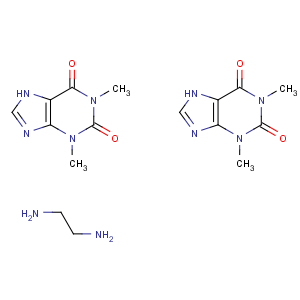Title: Aminophylline
CAS Registry Number: 317-34-0
CAS Name: 3,7-Dihydro-1,3-dimethyl-1
H-purine-2,6-dione compd with 1,2-ethanediamine (2:1)
Synonyms: theophylline compd with ethylenediamine; theophylline ethylenediamine; theophyllamine
Trademarks: Afonilum (Knoll); Aminodur (Berlex); Cardophylin (Rh>e-Poulenc); Euphyllina (Byk Gulden); Pecram (Novartis); Phyllocontin (Purdue Frederick); Phyllotemp (Mundipharma); Planphylline (Viatris); Pulmovet (Solvay); Tefamin (Recordati)
Molecular Formula: C16H24N10O4
Molecular Weight: 420.43
Percent Composition: C 45.71%, H 5.75%, N 33.32%, O 15.22%
Literature References: Prepn: Grüter,
US 919161 (1909 to Byk). Toxicity data: C. R. Thompson, M. R. Warren,
J. Lab. Clin. Med. 31, 1337 (1946). Comprehensive description: K. D. Thakker, L. T. Grady,
Anal. Profiles Drug Subs. 11, 1-44 (1982). Reviews of clinical experience: J. A. Stirt, S. F. Sullivan,
Anesth. Analg. 60, 587-602 (1981); A. G. Perry,
AACN Clin. Issues 6, 297-306 (1995).
Properties: Occurs as the dihydrate. White or slightly yellowish granules or powder. Slight ammoniacal odor. Bitter taste. Gradually absorbs carbon dioxide from the air and becomes incompletely sol due to liberation of theophylline. One gram dissolves in about 5 ml water, but the soln may become turbid on standing. Insol in alcohol, ether.
Keep tightly closed. LD50 orally in mice: 540 mg/kg (Thompson, Warren).
Toxicity data: LD50 orally in mice: 540 mg/kg (Thompson, Warren)
CAUTION: Potential symptoms of overexposure include acute restlessness, anorexia, nausea, fever, vomiting, dehydration; followed by tremors, delirium, convulsions and coma; may result in cardiovascular and respiratory collapse, shock, cyanosis and death.
See Clinical Toxicology of Commercial Products, R. E. Gosselin
et al., Eds. (Williams & Wilkins, Baltimore, 5th ed., 1984) Section III, pp 17-21.
Therap-Cat: Bronchodilator.
Therap-Cat-Vet: Bronchodilator.
Keywords: Bronchodilator; Xanthine Derivatives.

